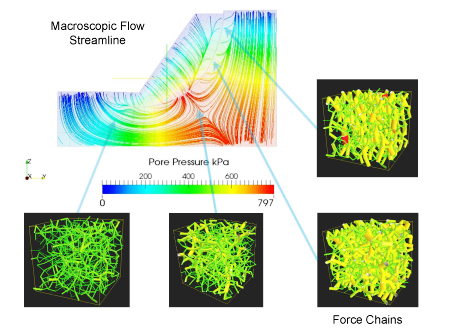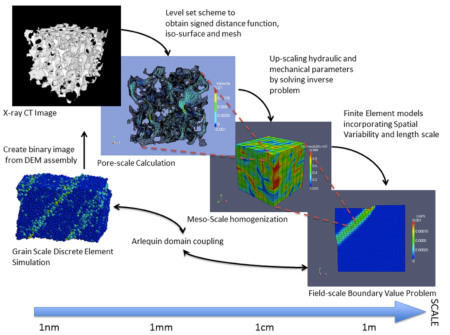Professor Steve Sun Receives Army’s Young Investigator Award
WaiChing “Steve” Sun, assistant professor of civil engineering and engineering mechanics, has been awarded the U.S. Army Young Investigator Program (YIP) Award to support further research on modeling how microscopic water and air seepages inside each pore of granular materials, such as sand, silt, and sediment, affect the bearing capacity and stability of the ground. In particular, the research objective is to understand why and how water sticks together inside the pores and how, collectively, the water may provide an unexpected amount of shear strength to the solid materials when subjected to external loading. Understanding how water, air, and particles interact is the key for many field-scale operations, from ensuring vehicle movement in wetlands, detecting underground land mines in a battlefield, predicting landslides, and leakage of contaminated wastewater underground, to understanding how ancient Egyptian monarchs built colossal statues.

Simulated force chain formed in wetted granular matters at different locations of a slope composed of wetted sand
The Army’s Young Investigator Program (YIP) awards are one of the most prestigious honors bestowed by the Army to outstanding scientists beginning their independent careers. The program is designed to identify and support talented scientists and engineers who show exceptional promise for doing creative research in order to encourage their teaching and research careers.
As part of the Army’s YIP award, Sun and his team will pursue a new research program that fully integrates advanced X-ray imaging techniques, theoretical and computational modeling of discrete-continuum coupling models, and topology and microstructural analysis using graph theory to predict the hydraulic and mechanical behaviors of wetted granular matters.

A summary of research conducted by Sun and his group
“By incorporating X-ray CT imaging techniques to verify and validate highly detailed computer simulations,” says Sun, “our research team will be able to provide, with unprecedented detail, rigorous comparisons of the simulated and actual particulate motion while liquid bridges and clusters are forming and rupturing inside the pores. The fundamental knowledge gained from this research may challenge our understanding on how particles and liquid bridges form force-chain network to re-distribute loadings (see illustration), and ultimately leads to more accurate, efficient, and physics-driven models for large-scale engineering and military operations.”
The proposed research will pave a fundamentally new path to predict the granular responses across the full spectrum of water saturation, from completely dry to fully saturated. The combination of grain-scale kinematics and macroscopic constitutive experimental data will enable a more faithful comparison between virtual and real experiments and lead to a more robust and accurate modeling of wetted granular matters, he said.
Previously, Sun’s work on pore-scale flow simulation in geological formation has provided evidence that the compaction band, a type of flow barrier, may form not only by compressing pores, but also by making flow channels more torturous and less interconnected. This finding sheds light on understanding the mechanism that leads to leakage of pore fluids, such as wastewater or radioactive materials, from some reservoirs but not others. His other work on studying the topological features of the dilatant shear band, a flow conduit formed in sand and rock, has won him the 2013 Caterpillar Best Paper Prize.
Sun joined Columbia from Sandia National Laboratories in 2014. In additional to his recent YIP award, this year he also received the DURIP award from Army Research Office for his work on frozen geological materials. The Sun research group is currently sponsored by Army Research Office, Department of Defense, National Science Foundation, Sandia National Laboratories, and Provost’s Office.
